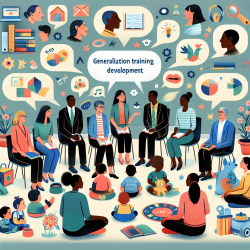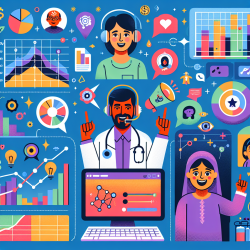In the ever-evolving field of early childhood education, professionals strive to provide the best possible learning experiences for children. This is especially crucial for those working with children with developmental delays. Recent research highlights the importance of generalization training during professional development (PD) to enhance educators' ability to implement evidence-based practices effectively across various contexts.
The Importance of Generalization Training
Generalization refers to the ability to apply learned skills across different settings and situations. In the context of early childhood education, this means that educators can transfer instructional strategies learned during PD to multiple classroom activities. The study "Assessing Generalization During Professional Development in Child Care: A Pilot Randomized Controlled Trial" underscores the significance of this approach.
Key Findings from the Study
- Implementation Fidelity: Educators who received explicit generalization training demonstrated higher fidelity in applying instructional strategies across different classroom activities compared to those who did not receive such training.
- Knowledge and Self-Efficacy: Both groups showed significant gains in knowledge and self-efficacy, but those with generalization training achieved greater improvements in applying skills beyond the initial training context.
- Child Outcomes: Children in classrooms where educators received generalization training exhibited significant gains in social-communication skills and engagement during shared book reading activities.
Applying Research Insights in Practice
The findings from this study offer valuable insights for practitioners seeking to enhance their skills and improve outcomes for children. Here are some practical steps to consider:
1. Incorporate Generalization Training into PD Programs
Ensure that PD programs include components focused on generalization. This can involve role-playing, feedback sessions, and discussions on how to apply instructional strategies across various classroom activities.
2. Utilize Shared Book Reading as a Core Instructional Activity
Shared book reading provides a rich context for teaching language and literacy skills. Embedding evidence-based practices within this familiar activity can enhance educators' ability to implement new strategies effectively.
3. Foster Collaborative Learning Environments
Create opportunities for educators to learn from one another through group discussions and peer feedback. This collaborative approach can reinforce learning and encourage the sharing of best practices.
The Role of Coaching in Enhancing PD Outcomes
The study also highlights the critical role of coaching in supporting educators' implementation of new skills. Coaches can provide personalized feedback, model effective practices, and help educators set achievable goals. This ongoing support is essential for sustaining improvements in practice.
Encouraging Further Research
While the study provides promising insights, further research is needed to explore the long-term impacts of generalization training on both educators and children. Practitioners are encouraged to stay informed about emerging research and consider participating in studies that contribute to the growing body of knowledge in this field.
Conclusion
The integration of generalization training into professional development programs holds great potential for enhancing educators' skills and improving outcomes for children with developmental delays. By applying these research insights, practitioners can make meaningful strides toward providing high-quality education that supports all learners' growth and development.










